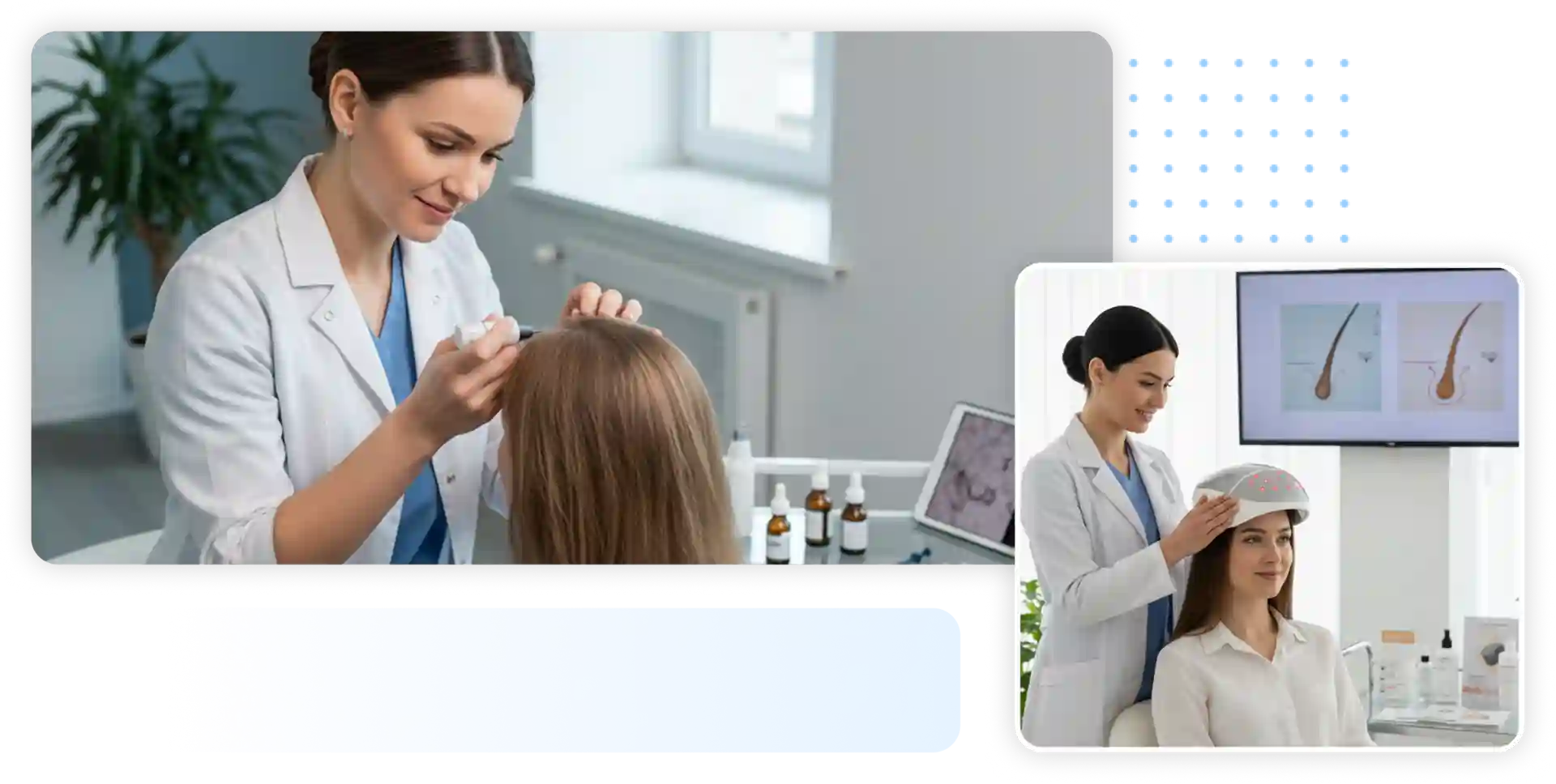Hormone Therapy for Women

Women’s Health as They Age
As women age, they undergo a series of physiological, hormonal, and psychological changes. Menopause, typically occurring between 45 and 55, brings about the cessation of menstrual periods and can entail symptoms like hot flashes and mood swings. Bone health becomes a concern due to the risk of osteoporosis, while skin tends to become drier and more susceptible to wrinkles.Metabolism slows down, necessitating a balanced diet and exercise to manage weight. Cardiovascular risks increase, demanding vigilance over heart health. Muscle mass decreases, but strength training can help maintain it. Hormonal changes continue to influence mood, energy, and sexual function, with regular medical check-ups being crucial. Cognitive function might experience slight changes, and maintaining mental acuity is achievable through stimulating activities.
Overall, embracing a healthy lifestyle and seeking medical guidance can promote a positive and fulfilling aging journey for women.
Women’s Health Management
Hormone Pellet Therapy
Performed typically every 6 months, this medical treatment delivers bioidentical estrogen and/or testosterone hormones to the body through small pellets inserted under the skin. These pellets are considered “bioidentical” meaning that these hormones are very similar to the body’s own hormones on a molecular level. They are designed to release these hormones gradually over time to address hormonal imbalances or deficiencies. Options for home use are also available.
Benefits of pellet therapy for women are consistent hormone levels, symptom relief caused by menopause, improved bone health, improved cardiovascular health, and improved mood and overall feelings of well-being.


Peptide Therapy
Human Growth Hormone (HGH), produced by the pituitary gland, is a crucial peptide hormone that regulates growth, metabolism, and body composition. HGH Peptides help increase the natural production of Human Growth Hormone by stimulating the pituitary gland. It maintains muscle and bone health, aids in cell repair, and influences metabolism and immune function.
O-Shot Therapies
Hormonal imbalances can play a significant role in causing sexual dysfunctions in women. These dysfunctions can encompass a range of issues related to sexual desire, arousal, orgasm, and overall sexual satisfaction. Low levels of estrogen can lead to vaginal dryness, discomfort during intercourse, and reduced libido. It can also impact blood flow to the genital area, affecting arousal and the ability to achieve and maintain vaginal lubrication.
While often considered a male hormone, testosterone also plays a role in women’s sexual health. Low testosterone levels can lead to reduced libido, decreased sensitivity in the genital area, and diminished sexual arousal.

Platelet-rich plasma (PRP) therapy
This therapy is a medical treatment that involves using a concentrated solution of platelets and growth factors from a person’s own blood to potentially improving sexual sensitivity, arousal, and orgasmic response. The growth factors and bioactive compounds in the PRP are believed to promote tissue rejuvenation, enhance blood flow, and potentially lead to improved sexual function and pleasure.

Regenerative medicine therapy
This therapy utilizes extracellular vesicles, also known as exosomes, for addressing sexual dysfunction impacted by menopause or hormonal imbalances. Exosomes derived from mesenchymal stem cells (MSCs) contain bioactive factors that help promote tissue repair and regeneration. In the context of sexual dysfunction, exosomes could be used to stimulate the regeneration of genital tissues, improving elasticity, blood flow, and overall tissue health.
These therapies also support nerve and blood vessel regeneration, potentially alleviating nerve damage, enhancing arousal, and improving sensation. Their anti-inflammatory properties might relieve discomfort during sexual activity, and their ability to influence collagen production and hormonal balance could address issues like vaginal laxity and hormonal imbalances that contribute to sexual dysfunction.

Hair Loss Therapy
Low levels of hormones, such as estrogen, progesterone, and thyroid hormones, can significantly impact women’s hair growth. Reduced estrogen and progesterone levels can lead to hair thinning, reduced hair density, and changes in hair texture. Here are the regenerative techniques available for potentially promoting hair growth:

Platelet-Rich Plasma (PRP):
PRP therapy involves drawing a small amount of the patient’s blood, processing it to concentrate the platelets. Platelets contain growth factors that can potentially stimulate hair follicles and promote hair growth.
Regenerate:
Some stem cells have the potential per studies, to differentiate into various cell types, including hair follicle cells. These stem cells, when injected into the scalp can potentially regenerate hair follicles.
Exosomes:
Exosomes are small vesicles released by cells that contain various bioactive molecules, including growth factors and microRNAs. Exosomes derived from stem cells or other sources can deliver these bioactive molecules to the scalp and potentially stimulate hair follicle growth.
These methods can be applied using a technique called microneedling. Microneedling involves creating tiny, controlled injuries on the scalp using fine needles. This process stimulates the body’s natural wound healing response, which can potentially lead to increased blood flow and growth factors in the scalp, promoting hair growth.
Find out how hormone therapy can help you get back on track and live a fuller, healthier life.
